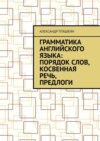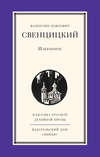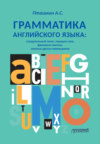Читать книгу: «Грамматика английского языка: порядок слов, косвенная речь, предлоги»
© Александр Пташкин, 2019
ISBN 978-5-0050-5929-1
Создано в интеллектуальной издательской системе Ridero
ПРЕДИСЛОВИЕ
Содержание учебного пособия соответствует требованиям программы по дисциплине «Английский» и апробировано в группах второго курса очного отделения иностранных языков Томского политехнического университета.
Пособие состоит из трех основных частей: Члены предложения, Косвенная речь и Проверочные работы.
В первой части пособия отдельно рассматриваются все члены предложения, особенности их употребления и структуры. Предлагается краткий обзор фразеологических единиц с предлогами, указывающими на обстоятельство.
Во второй части пособия представлены основные положения по трансформации предложений разных типов из прямой речи в косвенную, обращается внимание на лексические и грамматические изменения необходимые в при такой трансформации.
Третья часть включает в себя тестовые задания на повторение пройденного материала.
После предложенного теоретического материала в каждой из частей пособия представлены упражнения для тренировки и закрепления материала. Система упражнений построена с учетом общедидактических принципов и дают разнообразный материал для усвоения материала пособия.
Пособие содержит раздел с примерными тестами, предложениями для анализа и перевода на зачете или экзамене для лучшей подготовки обучаемых.
Материалы, представленные в пособии, способствуют увеличению объема фоновых знаний, и могут быть использованы в будущем в процессе педагогической практики.
Пособие может быть использовано как для работы в аудитории, так и для самостоятельной работы. Оно может быть также рекомендовано широкому кругу лиц, изучающих английский язык.
1. PARTS OF THE SENTENCE
It is necessary to distinguish the following parts of speech: principal and secondary parts and independent elements. The subject and the predicate belong to the principal parts. The secondary parts include the attribute, the object, the adverbial modifier. It is typical to distinguish the following independent elements: the interjection, the direct address, the parenthesis.
The subject acts as the «doer’ or agent of an action. Usually they are noun phrases. There direct and indirect objects. A direct object is meant to be a thing or a person affected by the action of the verb. An indirect object is normally a person who receives a direct object. The predicate tells us what the subject does. The attribute is a word ascribing a quality. The adverbial modifier is a word or a phrase which usually modifies a verb or an adjective.
The independent elements stand as the words and word groups which do not depend on any part of the sentence from the grammatical point of view.
1. State the parts of the following sentences:
1. Once upon a time this creature lived in the mountains.
2. That day she was walking along the street.
3. Surprisingly, he came to an office in the middle of the night.
4. At dawn we saw a large oak-tree.
5. A buzzing-noise came from that apartment.
6. That gentleman sat down at the foot of the mountain, and began to analyse.
7. She started at a sudden noise.
8. He climbed and she sat.
9. Climbing, they sang a song to a lady-bird.
10. They wanted to climb but there was no real opportunity to do it.
2. State the parts of the following sentences:
1. The trouble with this friend is that he was good at a certain degree.
2. A group of outstanding scholars made a great contribution to this field of knowledge.
3. They meant to be men of glory.
4. They had a habit of drinking that tea with lemon and sugar.
5. This room was successfully transformed into a great apartment.
6. It suddenly became the national tradition of this country.
7. There are different cases when you can get rid of it.
8. If you want to come on Friday, you should forget about your concert.
9. It is given to you by a nice fellow.
10. Then you can do whatever you want.
3. State the parts of the following sentences:
1. Do not follow my advice!
2. I wake up at six o’clock in the morning.
3. I have several pieces of cake for lunch.
4. I drank tea during the whole evening.
5. I have two hours for reading even at night.
6. That day she wished three cups of tea and two pieces of ham.
7. It was one of the exceptional hot days.
8. My wife made some cold coffee and put it into refrigerator.
WORD ORDER
Word order in English is of great importance. English words have hardly any inflexions and their relations to each other are shown by their place in the sentence and not by their form.
The word order in English is fixed and it is called the direct word order if it is the following:
SUBJECT – PREDICATE – OBJECT – ADVERBIAL MODIFIER.
# She loves her father greatly.
The indirect word order is:
PREDICATE – SUBJECT —OBJECT – ADVERBIAL MODIFIER.
# Have you nuts at home?
!Passive Voice. It is used to emphasize the verb and the object of a sentence rather than subject:
Active voice: He wrote this letter in 2012.
Passive voice: This letter was written in 2012.
1. State the type of word order in the following sentences:
1. I like ice-cream.
2. Does he often come here?
3. Hardly had he realized the situation, when he was asked to lead the group.
4. The bees were still buzzing.
5. «Did I miss?» asked Christopher Robin.
6. «Christopher – oh! – Robin», called out the cloud.
7. The air came slowly out, and Winnie-the-Pooh floated down to the ground.
8. «Is anybody at home?»
2. Form the correct word order in the following sentences:
1. Had ill I not been I should have come by all means.
2. After discussed the film we seeing it.
3. We last summer went to the mountains, we are going this summer to the Black Sea coast.
4. I have been this year to the museum several times.
5. In the dead of night the scouts were moving along a narrow path noiselessly.
6. But he could not, not know how to turn and did go away.
7. The mountains a long way away were and you could see on their tops snow.
8. I do believe not of his a single word.
3. Translate the sentences from Russian into English paying attention to the word order in the sentence:
1. Она просила нас высказаться, после того как он выступит с докладом.
2. Ей очень нравится читать статьи в оригинале.
3. Кошки настоящие друзья человека.
4. Наш родственник предложил поехать в Тунис.
5. Почему она не любит общаться?
6. Ее не видели уже два месяца.
7. Почему вы не сходили в музей?
8. Он должен увидеться с ней.
9. Бабушка очень хотела, чтобы я ответил на письмо.
10. Она достаточно ленива, чтобы действовать.
11. У нее есть чувство собственного достоинства.
12. Она пригласила подруг вчера вечером.
4. Form the sentences in passive:
1. Somebody noticed the aircraft at that moment.
2. He cleaned that vase yesterday.
3. She was reading the book.
4. They built the house on the basis of the previous building.
5. They often invite me to parties.
6. My grandfather offered me to play chess.
7. She sent a postcard to a right address.
8. We heard him playing the guitar.
9. I cooked that cake for the first time in my life.
10. She left her child alone.
THE SUBJECT
The subject is the principal part of a two-member sentence. It can be expressed by a noun in the common case, a pronoun (personal, demonstrative, defining, indefinite, negative, possessive, interrogative), a substantivized adjective or participle, a numeral, an infinitive, a gerund, etc. In a declarative sentence, the subject usually appears before the verb. In an interrogative sentence, the subject follows the auxiliary verb. In an imperative sentence it can be observed or not.
# These people met at the conference.
# Do they know each other?
# Eat!
1. Point out the subject and say what it is expressed by:
1. Peter is talking.
2. The train stopped.
3. Nigel Blake arrived in Oxford at 5.20 in the afternoon.
4. The girl opened the door and entered the room.
5. A couple was standing by the door and Kate had the impression that the woman was in tears.
6. I know him very well.
7. Anybody can answer the question.
8. He took me to the room upstairs.
2. Translate the sentences into English and define the subject:
1. Придете сюда сегодня вечером?
2. Великобритания расположена на островах.
3. Кто-то ждет вас внизу.
4. «The» – определенный артикль.
5. Говорят, он уедет в четверг.
6. Если хочешь разозлить кого-нибудь, просто скажи ему, что ты о нем думаешь.
7. Сейчас только семь часов.
8. Сегодня очень холодно, да?
9. Вчера весь день шел дождь.
10. Становится все труднее.
11. Утром они безусловно встретятся.
12. А ты видела его на суде?
13. Прекрати!
14. Что ты ищешь здесь?
15. Разные люди были на той вечеринке.
3. Translate the sentences into Russian:
1. It takes me 10 minutes to get to school.
2. It’s a pity he hasn’t come.
3. Gold, silver and platinum are precious metals.
4. He is expected to come at any moment.
5. The plane was reported to land safely.
6. You seem to know the material very well.
7. He proved to be right in the end.
8. She is unlikely to be late.
Бесплатный фрагмент закончился.
Начислим
+4
Покупайте книги и получайте бонусы в Литрес, Читай-городе и Буквоеде.
Участвовать в бонусной программе
















